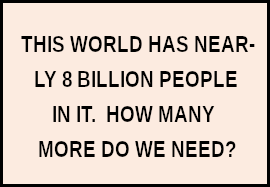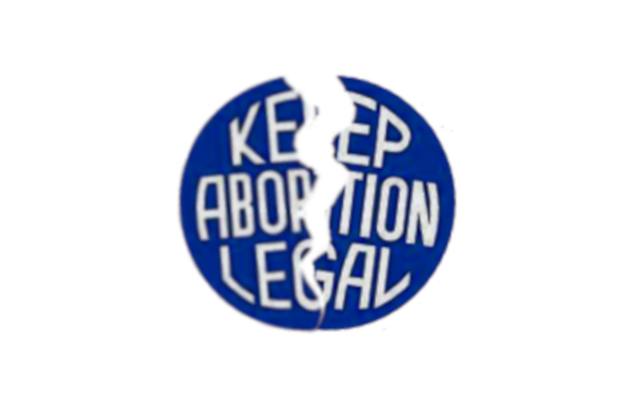
Well, it’s happened. SCOTUS has dropped the big one by overturning the Roe vs. Wade decision of 1973. In one fell swoop, 49 years of the guarantee, by the U.S. federal government, of legal access to abortion has been eliminated.
This decision does not mean abortion is suddenly illegal in the USA; what it means is that it’s now up to the individual states whether to permit or criminalize abortions within their perimeters. About half the U.S. states are expected to criminalize them.
They just couldn’t wait
23 states in the United States have passed trigger laws outlawing abortion, to take effect as soon as or soon after Roe vs. Wade is overturned — and that trigger has now been pulled.
Texas leads the way
I myself am well past reproductive age but if I were half as old as I am now, married, and “at risk” of an unplanned pregnancy, I would not want to live in the Lone Star State. If my husband came home one day and said his company was relocating to Austin and I should start thinking about what kind of house I wanted to live in, I would refuse to go. “But it’s Texas” I would wail, knowing what sort of retrogressive attitudes prevail there (I felt this way from even before the current explosion of the abortion debate). Texas even has a law allowing one private citizen to sue another private citizen for assisting yet another private citizen to get an abortion. So in theory, a bus driver ferrying a pregnant woman to a place where abortions can be obtained could be sued for $10000. These days, Texas may be the most difficult place to find an abortion provider, but other states, like Florida, are not far behind.
History of Roe vs. Wade
Roe vs. Wade was a famous court case where Norma McCorvey (under the court-assigned alias “Jane Roe”) sued Dallas county District attorney Henry Wade for the right to have an abortion, then illegal in Texas. The case was appealed all the way up to the U.S. Supreme Court, which ruled having an abortion is part of the constitutionally guaranteed right to privacy, and that the federal (U.S.) government has the jurisdiction to make that ruling. It is this last part that was recently overturned, effectively returning the power to regulate abortions back to the individual states.
So how did the current events happen?
Former President Donald Trump had the luxury of appointing 3 justices to the U.S. Supreme Court — namely Neil Gorsuch, Brett Kavanaugh, and Amy Coney Barrett; all arch-conservatives. As U.S. Supreme Court justices are appointed for life, it will be a long time before this conservative bias fades away.
A European perspective
The industrialized nations in western Europe have a somewhat more liberal attitude. Take France, for example. France was the first industrialized nation to embrace modern contraception (this is how it got its “ooh la la” reputation). France offers abortion on demand; and so does Germany and Spain. Italy and the UK are more restrictive, allowing abortions “for social, emotional, medical, or criminal reasons” only. Ireland (ROI & NI) is the most restrictive, allowing abortions only when the woman’s life is at risk. German health insurance pays for contraception, but only for women up to age 22 (what sort of message does that send?)
The debate in its grittiest terms
A lot of the debate is presented in the most inoffensive language. Have you ever noticed that both sides are pro? The pro-choicers are pro-choice and the pro-lifers are pro-life. No one is ever anti. Well I’d like to reframe this debate in the rudest words possible, as follows:
Forcing a woman to carry and give birth to a baby she doesn’t want is 9 months of slavery followed by 20 years of house arrest. She has to give up the best years of her life for the sake of the next generation; and whatever else she was planning to do with her life — well, just forget that now. These attitudes are deeply ingrained into society; I remember, while watching the movie Plan 9 From Outer Space (a terrible film from Hollywood’s worst director) one character saying “women are for the betterment of the race” which my mind instantly translated as “diaper duty”.

But abortion kills innocent children, say the pro-lifers. Isn’t a woman’s convenience and freedom dwarfed by a baby’s right to exist at all?
Stated in the above terms, the abortion question is not so simple anymore. You’re damned if you do and damned if you don’t.
The religious viewpoint
Many religions are staunchly pro-life. Catholicism, the faith I grew up in, not only condemns abortion, but also contraception and sterilization surgeries (including tubal ligations and vasectomies). While the doctrines of a church do not [always] have the force of law, billions around the world are accepting enough of the teachings of their religion to do as they are told.
It is worth noting that in the field of religion, the church that has the most adherents is the church that wins. Encourage your followers to have large families, and after 200 to 1000 years your flock will be as numerous as the stars. There are 1.3 billion Catholics in the world today, compared to the Shakers, who died out (they did not believe that having children was a good thing).
My current religious viewpoint
I am now a member of a very small religious group. My own belief is that we are not our bodies, but souls who inhabit them. We begin each lifetime by searching for a body to call our own, usually a new as-yet-unborn body. For me, this pairing (called the assumption) happened one day before I was born; if that fetus had been aborted, I simply would have continued my search somewhere else. I am convinced that a fetus is not truly human until the assumption has occurred; until then abortion is not the tragedy the pro-lifers make it out to be. (Although as a compromise, I’d be willing to accept a so-many-weeks cutoff date.)
The reincarnation perspective
This world is in the middle of a population growth boom — with nearly 8 billion worldwide. Why this relentless growth towards more, more, more? One reason is that as people age, they may be (subconciously) concerned that there won’t be a body available for them for their next lifetime. Then they may become one of what I call the MBFEWTWTON group (More Babies For Everyone Whether They Want Them Or Not). They ballyhoo the glories of universal parenthood and rail against contraception, abortion, sterilization, withdrawal, self-stimulation, and gays and lesbians.
In spite of global population now being higher than ever, some are arguing that 8 billion is still not enough and that we need more. And when the world gets too crowded? Perhaps they can encourage the elderly to “hurry up and die”.

Other pressures towards population growth
Many industries depend on continued population growth to keep going. Take home construction for example. If the population were to become stable, there would be no reason to build additional housing — except for repairs to existing houses and to replace homes that have become so worn-out and decrepid that they have to be torn down. Construction companies would have nothing to do, and many would be forced to close and lay off their workers.
Other forms of construction for things like infrastructure, manufacturing, and durable finished goods would suffer as well. But those who profit from these businesses have no intention of quietly passing into the night, so they champion continued unlimited worldwide reproduction.
Entreprenuers are always looking for new business opportunities. If the natural resources are there, then of course they’re there to be used. But exploiting natural resources requires both workers and a market in which to sell the finished goods — and population growth provides both.
And your parents probably would encourage you to have kids. They did, didn’t they?
Activities connected to babymaking release oxytocin, a feelgood hormone produced in the hypothalamus and associated with social activities, feelings of love, and reproduction. The latter activities include everything from sex to helping the li’l darlings on with their winter boots. People are not going to give that up easily.
What about abstinence, rape, and incest?
The short answer is, if you don’t want to get pregnant, don’t have sex. This always works, and is not condemned by anyone. But we as a species have been given finely tuned reproductive systems along with the will to use them. Abstinence can be hard to practice; so if a usually abstinent woman does gets pregnant, she obviously gave in to her urges at least once. This is perfect from the viewpoint of the moralists; they get the baby they want her to have, and can say the fault is all hers anyway.
Many of the early attempts to pass anti-abortion laws in the USA have had exceptions for rape and incest, but today, many the proposed laws omit these exceptions. This punishes the victim. I suppose the MBFEWTWTON‘s take the attitude a baby is a baby, and why punish him or her just because of the way the pregnancy got started?
Even abortion to save the life of the mother is not exempted in some countries.
And what of adoption?
An expectant woman always has the option of giving her baby up for adoption after it is born. But she still has to go through the rigors and dangers of pregnancy, and giving up a child after it is born is an emotionally challenging experience (again, due to oxytocin). Plus many babies grow up wondering who they are, and understandably want to and seek and reconnect with their birth mothers. If you don’t want someone knocking on your door 30 years into the future, perhaps the adoption route isn’t for you.
So what can we do?
No one, least of all myself, wants to tell people they can’t have kids. But we as a society can at least stop encouraging it. In the social democracies of Europe, there are some very generous benefits for families in an attempt not to reduce but to totally erase the burden of raising a family. I personally believe families deserve some financial help, but the burden should be first on the family and only secondarily on the taxpayer — because otherwise those taxpayers without children wind up paying for other people’s children.
In particular, if there is population decrease in a given city, province, region, or country; stop publishing “doom and disaster” news articles that say how horrible this is and we must do something to reverse it. Mostly, only one side of the issue is being presented, and that’s a sure sign that somebody is trying to manipulate public opinion — although Yahoo News often presents the opposite viewpoint — for example, couples that chose not to have children and never regretted it.
Ultimately, the relentless growth of population will be lessened if we just stop pushing people the direction of more, more, more! Some of the younger generations in Western society today are choosing not to have children at all because they think this world is no longer a fit place to bring a youngster into.
But even if we are able to reduce the world’s population by a mere 1% each year, it would still take us nearly 30 years to return to the 6 billion level. Our planet would be a better place to live if its resources weren’t strained so much. Problems such as war, famine, and even global warming would either diminish or go away altogether if we could accomplish this.

Changing the conversation
So far, the question has been women’s rights vs. the rights of the unborn. But let’s set women’s rights aside for the moment — are more children necessarily the better option? Or maybe fewer would be better? Many who have not yet done so are looking towards starting a family of their own someday with 2 or 3 or more kids. “I can afford it” they will say. But what about when those kids grow up, will the world have a place for them as independent adults? If we continue to have unlimited growth, the nearly 8 billion we have today could become 11 billion or more in 25 years — and then what? If this planet of ours is to survive, let’s not just look at today’s needs and wants, but let’s imagine what the world will be like 50 or 100 years from now. Just above is a copy of a protest sign I saw at a Roe vs. Wade protest rally. So how many more do we really need?
